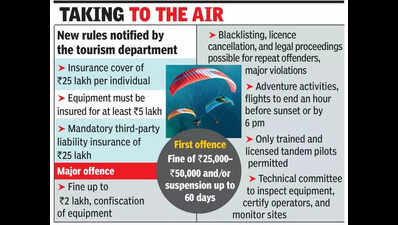ARTICLE AD BOX

Panaji: Operators of paragliding, paramotoring, hot air balloons, and drone flights in Goa will have to provide accident insurance of Rs 25 lakh for every pilot and passenger. Such adventure sport operators also face fines of up to Rs 2 lakh and arrest for safety violations.Govt has also made it compulsory for operators to register with the department of tourism and obtain a registration certificate before commencing activities. A fee of Rs 1 lakh per aircraft per season, Rs 10,000 per tandem pilot, and Rs 2,500 per solo pilot per month has been fixed. Only trained and licensed tandem pilots with specified flying hours will be permitted to operate commercially. Solo trainees will not be allowed to fly unsupervised.The new norms are part of the draft Goa Aero Sports Rules, 2025, notified by the tourism department this week. The rules come in the backdrop of the death of a 27-year-old female tourist and her instructor during a paragliding mishap at the Keri plateau early this year. The rules make it mandatory for operators to provide accident insurance and third-party insurance, along with Rs 5 lakh coverage for equipment. The insurance should cover accidental deaths, disability compensation and medical expenses.
Violations will attract penalties ranging from temporary suspension and confiscation of gear to cancellation of licences and legal action for repeat offenders.Under the new norms, all paragliders and paramotors must carry annual test certificates for porosity, line strength, and airworthiness. Paramotor engines must be sourced from manufacturers recognised by the directorate general of civil aviation (DGCA) or other authorised agencies and backed by valid certification.
Operators will have to maintain inspection logs signed by certified technicians and make them available for audit.A technical committee headed by the tourism director will be tasked with inspecting and certifying equipment, assessing pilot expertise, and fixing the carrying capacity of flying sites. The committee may also identify new sites, alter or cancel operations depending on the weather, and conduct surprise inspections during the season.
Internationally recognised certification standards, including those of the Federation Aeronautique Internationale (FAI) and the Bureau of Indian Standards (BIS), will be used for approving equipment.To improve safety, flights will only be permitted in daylight hours and must conclude an hour before sunset or by 6pm. Aero sports will be banned in adverse weather conditions. Operators are required to inform the local police station and nodal agency before starting seasonal activities, providing details of duration, timings, and rates.The policy also prescribes indemnity bonds, releasing state govt from any responsibility for medical or rescue costs in case of accidents. For Goa’s adventure sports industry, the policy marks a shift from loosely monitored operations to a tightly regulated framework. For tourists, the department has pitched it as a move to restore confidence in adventure sports after repeated safety concerns.



.png)
.png)
.png)
















 8 hours ago
3
8 hours ago
3









 English (US) ·
English (US) ·